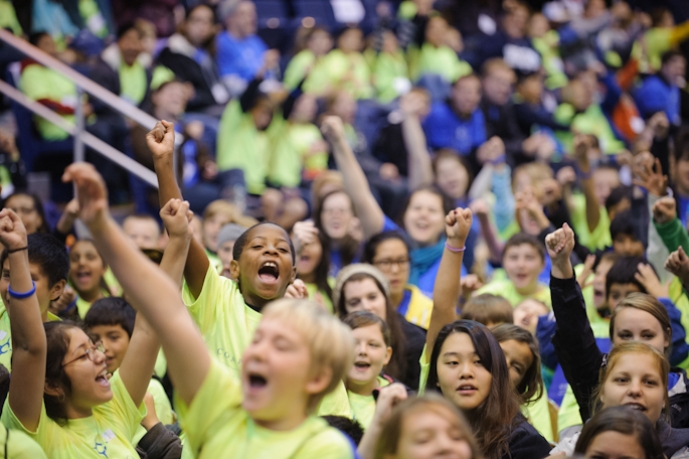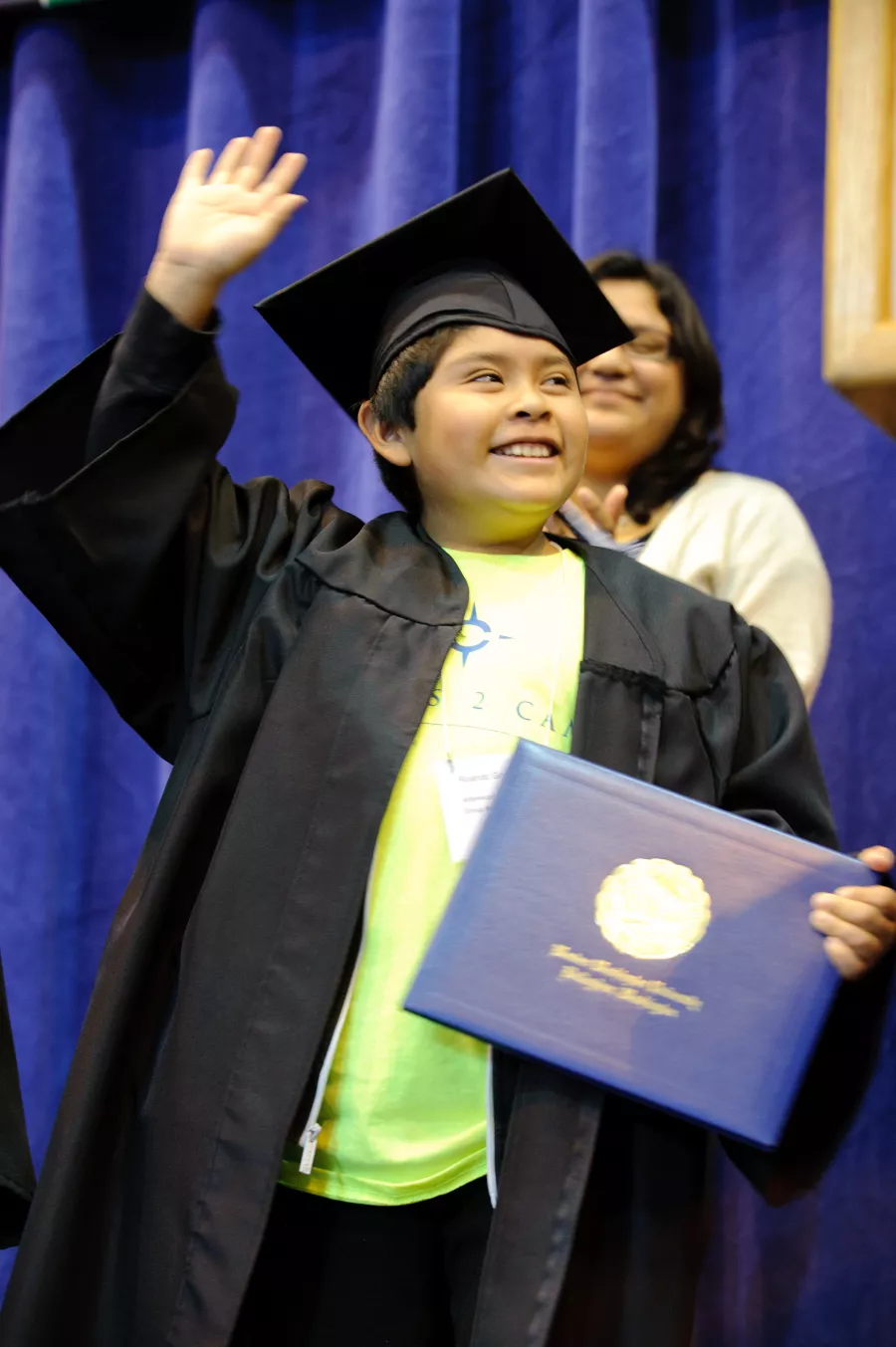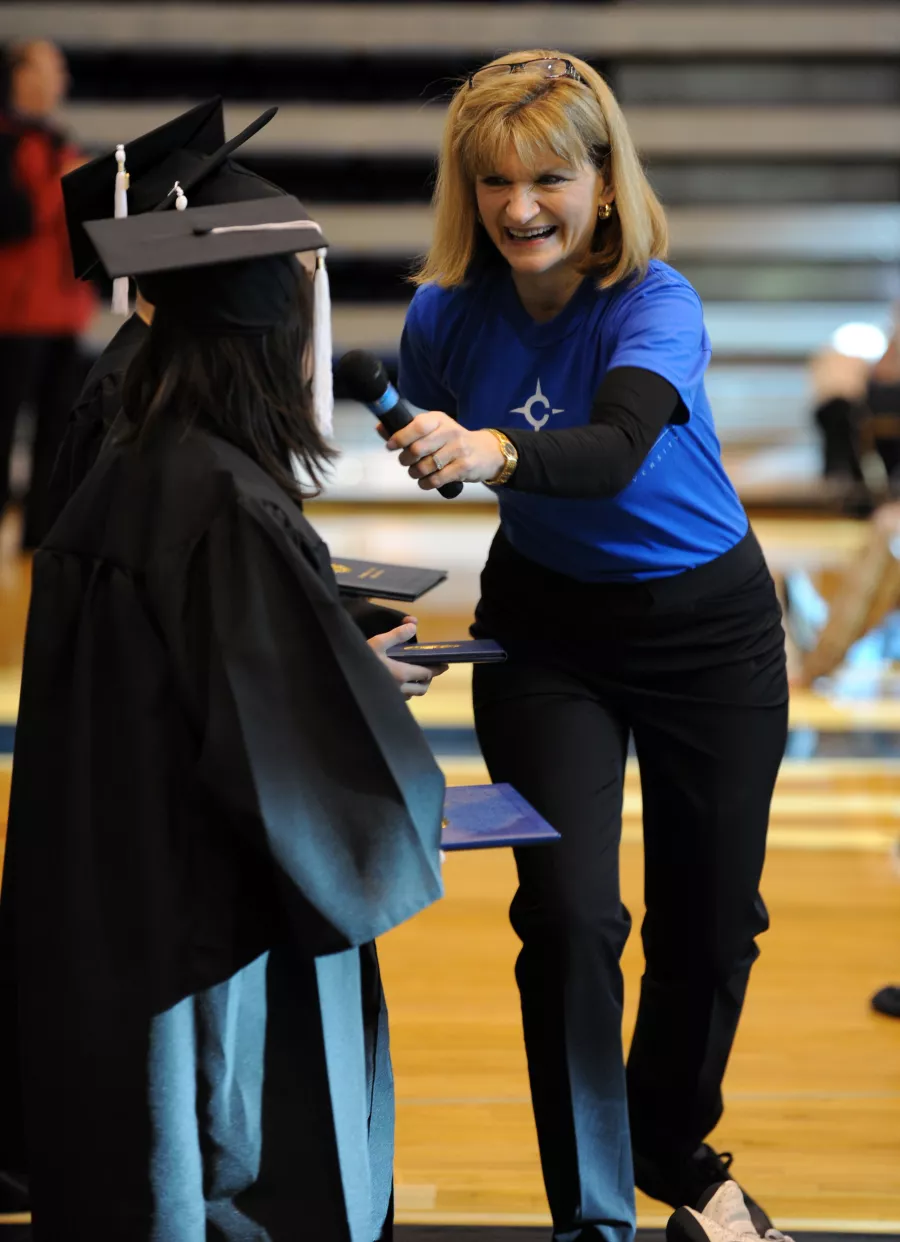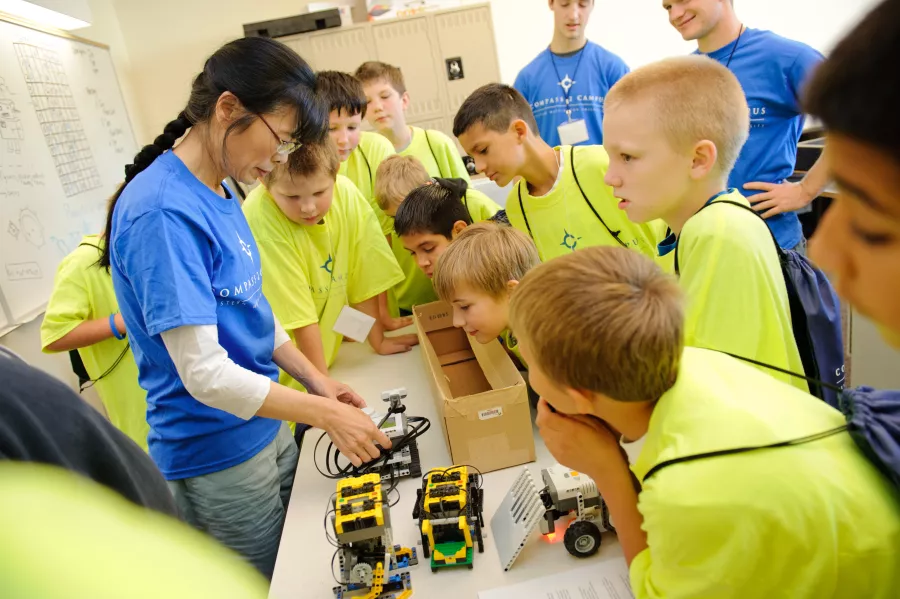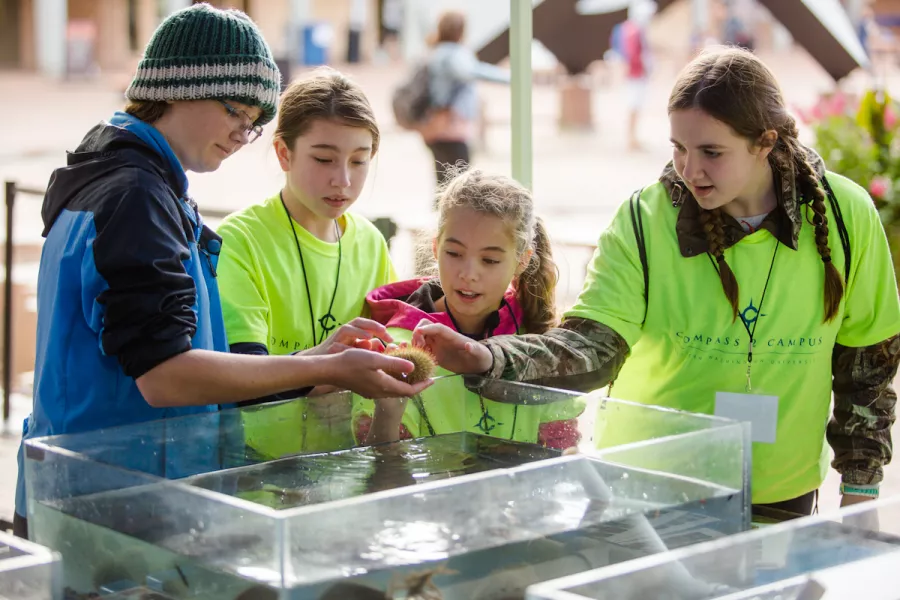The voices of hundreds of fifth-graders rise in the crisp autumn morning as youngsters pour out of school buses and set foot on Western’s campus, most for the first time.
Their green T-shirts form a river moving from south campus to Carver Gym for an official welcome to Western. Many smile as they see the college students on their way to class; the Western students’ faces light up, too.
Each fall since 2009 fifth-graders have been coming to Western for a daylong kickoff of the Compass 2 Campus (C2C) Mentorship Initiative. The kids sit in on classes, eat lunch in a dining hall and watch a quick “commencement” ceremony designed to get them to picture themselves in a cap and gown. They also ask lots — and lots — of questions.
Then the real work begins.
C2C sends Western student mentors — nearly 700 this year — to classrooms throughout Whatcom and Skagit counties to work at least four hours a week with the students for the remainder of the school year.
The mentorship doesn’t stop there. C2C mentors will continue to follow the fifth-graders for the rest of their middle school and high school careers. The first kids who came to Western as fifth-graders in 2009 will begin their senior years this fall — and C2C mentors have been in their classrooms ever since.
Compass 2 Campus is now one of the state’s largest school mentoring programs. So far, C2C’s Western student mentors have spent more than 180,000 hours in the schools. In all, C2C serves between 450-500 classrooms in 31 schools each year, working with about 10,000 students.
This year, mentors are in 31 Title I schools in two counties — schools where a majority of students are considered low-income and whose prospects for graduating from high school and continuing on to post-secondary education are not often as bright as those of students from other schools.
C2C founder and Executive Director Cyndie Shepard explains it is C2C’s goal to “encourage and support underrepresented first-generation, often-marginalized students from low-income families to stay in school and go on to some form of post-secondary education.”
That may not mean coming to Western — the program isn’t geared just toward recruiting students to campus.
“It’s really a program that says, ‘Be a lifelong learner and reach for your dreams,’ ” Shepard says.
But if they do make it to Western, “We hope they join Compass 2 Campus and turn around and become C2C mentors to complete the cycle.”
C2C rises from Phuture Phoenix
C2C originated at the University of Wisconsin Green Bay, where Cyndie’s husband Bruce Shepard, was chancellor.
Cyndie, who had a long, successful career as a K-12 educator, had left her post as the administrator for special education in 11 school districts throughout eastern Oregon when they moved to Green Bay, and she wanted to continue her work with K-12 students.
She was touring a Title 1 school in Green Bay searching for volunteer opportunities in the community when the principal was called to discipline a boy who had been disruptive in class.
The principal cut the tour short and suggested Shepard talk with him while she called his mother.
Shepard got the boy talking and calmed him down. Then she asked, “What do you want to be when you grow up?”
“He got angry again,” Shepard remembers. “He folded his arms and stuck his lip out and said, ‘I’m gonna end up in prison, just like my dad.’”
“It was kind of like a knife going through my heart,” she says.
So she asked the principal how she and the University of Wisconsin Green Bay could help. Without hesitation, the principal’s answer: Send us mentors.
Shepard co-founded, created and helped launch and run the Phuture Phoenix mentoring program for seven years before her husband became Western’s president in 2008. Soon after the Shepards arrived in Bellingham, the state’s Higher Education Coordinating Board contacted Cyndie and asked her to give a presentation on the program.
The board was impressed and thought the mentoring program could help boost high school graduation rates in rural Whatcom and Skagit counties. It later brought House Bill 1986 to the legislature proposing Western as the pilot university for the program.
The bill passed, and former Gov. Christine Gregoire signed it into law in April 2009 with the expectation it would take two years to get the program up and running. By September of that same year, Compass 2 Campus was in 12 elementary schools.
That first year, Shepard expected about 50 Western students to sign up for the C2C mentor training course. She got 465.
About two-thirds were planning to become teachers, Shepard says. Today, less than one-third are education students. The rest are coming from all over campus, including the sciences, Human Services, Psychology, Huxley College of the Environment and the College of Business and Economics.
Building work-life skills
But two years ago Shepard began to realize the curriculum for mentors wasn’t enough.
“Our students didn’t quite know how to work in those populations because many of the cultures of the students were very different from their own,” she says. “We realized we needed a strong social justice element.”
She worked with other academic departments to develop a new five-credit course, “Youth Mentoring Toward Social Justice.”
The new class also counts toward Western’s graduation requirement of at least two courses in comparative, gender and multicultural studies.
“My goal in all of this has been to support Bruce’s mission for the campus to become more diverse,” Shepard says.
But as the program has developed over the years, Shepard has also heard from students that mentoring gives them valuable skills to bring to the workplace, no matter their field.
“We all know when you mentor you learn more than the mentees do,” Shepard says.
Finding a path
Alexa Tucker (’14, History/Social Studies) may know this better than anyone.
Tucker, 24, from Redmond, became involved in C2C as a freshman during the program’s second year, and she learned about C2C as she was trying to decide between education and pre-law.
She decided to give C2C a try, but still wasn’t sure what she’d gotten herself into the first time she stood in back of a sixth-grade classroom.
“I was totally intimidated,” she remembers. “I had never been in a school where I wasn’t a student.”
On that first day she began keeping a journal — which she has kept up ever since — including notes on two boys in particular whom she still mentors today as they prepare to apply to colleges in the fall. These students were among those in the first C2C cohort and will be the first group to graduate high school next spring.
Those first weeks in their classroom, Tucker remembers she worked hard to build the boys’ trust, and the following quarter they began warming up to her and asked that she be their mentor. After that second quarter together, she made them a promise: “I’ll follow you until you graduate — or I do.”
Tucker ended up graduating first, but she’s still a C2C mentor as she completes her master’s degree in teaching at Western.
Along the way, more students have joined her growing circle of mentees.
As Tucker follows her students, she works hard to get them to see their potential — the potential she has seen in them from early on. She uses her own story as inspiration: Tucker and her siblings were raised by a single mother, and she is the first of her family to go to college. (Her younger sister, Lauren, is now a C2C mentor at Western as well.)
“I didn’t even think of college until the 11th grade,” Tucker admits. “I hadn’t even heard of Western, and I grew up in Washington.”
It wasn’t until she heard her friends talking about their college plans that she got curious about higher education and toured Western.
Tucker hopes her mentees’ first-hand knowledge of a college campus — and knowing college students — will make college feel more attainable.
Her first two mentees even attended Tucker’s undergraduate graduation last year.
“I think it really solidified what I’d been talking about all these years,” she says. “If your path in life doesn’t include college, that’s fine. But I want you to know that college is an option. And I want you to know you can go if you want to.”
A wise investment
C2C has never received operating funding from the state Legislature, but relies on grants and donations.
The costs for tour day and lead mentor transportation are covered by donations raised at an annual brunch in the spring.
“You would think this program would cost more than it does,” Shepard says, explaining it costs only about $35 per fifth-grader for the trip to Western.
As C2C ends its seventh year, Shepard is preparing to say goodbye. She and Bruce will retire at the end of the academic year. A national search is under way to find her successor.
“It’ll be hard for me to leave because it’s my baby,” she says. “But I’ll stay in touch. I certainly hope to come back and hand out the first scholarship.”
Meanwhile, Central Washington University has adopted the program as well. That makes five schools total in Wisconsin and Washington using this mentoring model.
And after Tucker graduates this spring, she plans to teach middle school social studies and language arts in Bellingham.
And it all started with Compass 2 Campus.
“I think about the path it lead me to. As a freshman, I made this choice to sign up for Compass 2 Campus, and I didn’t know where it would take me. It’s changed my entire life.”
